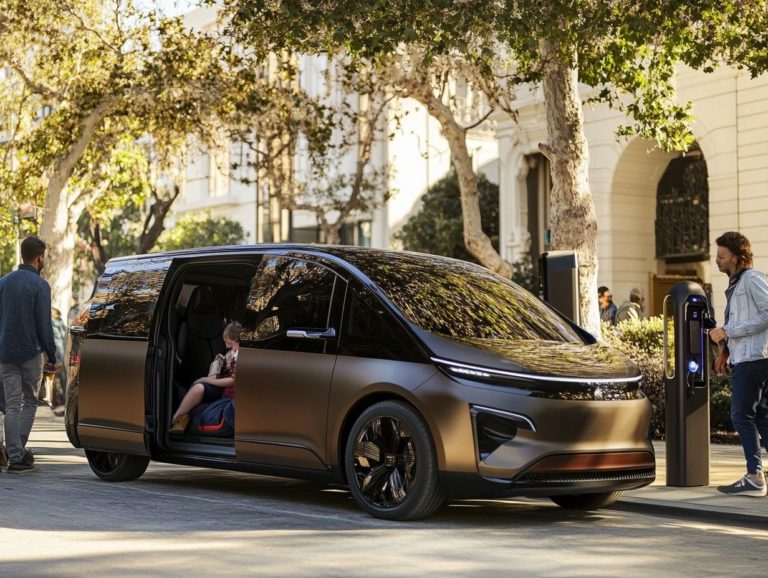73. how to calculate the cost of charging an ev
Electric vehicles (EVs) are becoming increasingly popular. Understanding the costs associated with charging them can feel overwhelming.
This article will guide you through the various factors that affect your charging expenses. We will cover electricity rates, battery efficiency, and more.
Practical tips will help you save on charging costs. This ensures your switch to electric is both eco-friendly and budget-friendly!
Contents
Key Takeaways:
Electricity rates, vehicle battery capacity, and charging station type all play a role in the cost of charging an EV.
Calculating the cost of charging can be done using a simple formula that considers electricity rates and charging time.
To reduce costs, consider smart charging strategies and alternative options, like public charging stations.
Understanding Electric Vehicle Charging Costs
Understanding the costs of electric vehicle (EV) charging is crucial for anyone thinking about switching to an electric vehicle in the UK. Several factors influence these expenses, including the type of charging home or public.
As you learn more, you’ll see how charging points, installation costs, and smart meters affect the overall financial picture of owning an electric vehicle. This knowledge helps you budget effectively and promotes a sustainable driving solution.
What Factors Contribute to the Cost?
The cost of charging your electric vehicle can vary significantly based on factors such as your vehicle’s battery capacity and charging speed. It’s essential to grasp these elements for estimating your expenses and making informed choices.
Larger battery capacities usually lead to higher charging costs because they need more electricity. If you choose faster charging, you may encounter higher prices at public locations.
Charging at home tends to be more cost-effective, allowing you to use lower residential rates. Public stations may charge more, especially during peak times, adding complexity to your cost assessment.
Calculating the Cost of Charging an EV
Calculating your EV charging costs is vital for budgeting and understanding the long-term benefits of EV ownership, especially when exploring the cost of public EV charging.
By knowing the price per kilowatt-hour (kWh) from your energy supplier, you can estimate your costs accurately. This estimation depends on your vehicle’s battery capacity and the total kWh used during each charging session.
With this knowledge, you can make informed choices that align with your financial goals and commitment to sustainable driving.
Formula for Calculating Charging Costs
Calculate your charging costs now! This simple formula gives you the power to estimate your expenses accurately: Total Cost = (Battery Capacity in kWh) x (Electricity Price in pence per kWh). To learn more about how to track EV charging costs, this straightforward calculation helps you as an EV owner to estimate your expenses based on the kilowatt-hours consumed during charging.
Let s break it down further. The ‘Battery Capacity’ refers to the total energy storage of your vehicle, typically measured in kilowatt-hours (kWh). For instance, let s say your electric vehicle has a battery capacity of 60 kWh. This means it can store energy for several hundred miles of travel.
Now, consider the ‘Electricity Price,’ which is the cost per kilowatt-hour and can vary depending on your location and provider. For example, if the local electricity price is 15 pence per kWh, charging your vehicle from empty would cost 60 kWh x 15 pence, totaling 900 pence or 9. Additionally, for a comprehensive overview, check out resources on understanding the costs of EV maintenance.
You can easily adjust your estimates by changing the battery capacity or electricity price in these calculations. If your EV had a higher capacity of 100 kWh at the same electricity price, your charge would increase to 15. This flexibility enables you to explore multiple scenarios with ease.
Factors that Affect Charging Costs
Several factors influence charging costs for electric vehicles, including electricity rates, time of use, vehicle battery capacity, and the type and location of charging stations. Understanding these factors helps you plan your charging better.
Grasping these variables is essential for refining your charging strategy and effectively minimizing expenses over time.
Electricity Rates and Time of Use
Electricity rates and the time of use play a pivotal role in determining the cost of charging your electric vehicle. By charging during off-peak hours, you can save a lot of money, as many energy suppliers offer lower rates during these times.
This strategy helps you maximize charging efficiency without straining your budget. For example, numerous utility companies designate off-peak hours as nighttime or weekends, often resulting in rates that can be as much as 30% lower than those during peak periods.
By using these reduced rates, you can substantially decrease your monthly electric bills. A study by the Department of Energy reveals that charging your electric vehicle overnight could save you around $500 annually compared to charging during peak times.
This also helps stabilize the energy grid, easing the load during high-demand hours.
Vehicle Battery Capacity and Efficiency
The battery capacity of your electric vehicle is crucial in determining both charging costs and energy consumption. If you re eyeing vehicles with larger batteries, like the Tesla Model 3 or Porsche Taycan, be prepared to use more kilowatt-hours to charge them. However, they often reward you with superior efficiency and extended driving ranges.
This is particularly relevant when you consider popular models such as the Hyundai Ioniq, Kia EV6, and BMW i4, each showcasing different battery sizes and technologies. For example, the Hyundai Ioniq makes excellent use of its moderate capacity to deliver an impressive range, while the Kia EV6, boasting a larger battery, provides faster charging times that can significantly impact your overall ownership costs.
On the other hand, the BMW i4 presents itself as a premium option, striking a balance between battery capacity and performance, which in turn affects both efficiency and charging expenses. Understand these details to choose the electric vehicle that fits your needs.
Charging Station Type and Location
The type and location of charging stations can significantly influence the costs associated with charging your electric vehicle. Public charging prices vary; rapid chargers often come with higher fees compared to the comfort of your home setup. It s crucial for you to choose wisely to ensure cost-effective energy consumption.
For instance, investing in a dedicated charging unit at home can lead to lower electricity rates, particularly during off-peak hours, effectively minimizing your overall costs. Conversely, some municipalities even offer free charging, while others may impose a premium.
Rapid chargers, designed for quick top-ups during long journeys, typically command the highest rates, largely due to their convenience and strategic locations near highways or bustling urban areas. Thus, it’s essential for you to weigh the benefits of speed against potential costs based on where you plug in.
This will give you the power to make informed decisions about charging your vehicle, maximizing both convenience and savings.
Start planning your charging strategy today to maximize savings and enjoy your electric vehicle to the fullest!
Tips for Reducing Charging Costs
You can effectively reduce charging costs by using a range of efficient charging strategies and exploring alternative options.
Take advantage of available incentives and tax credits to enhance your charging experience while minimizing expenses and maximizing your investment in electric vehicles.
Efficient Charging Strategies
Implementing efficient charging strategies can lead to significant savings for you as an electric vehicle owner.
Charge at home during off-peak hours and use a smart meter to monitor your energy consumption. This helps you optimize your charging routine and effectively cut costs.
Understanding local electricity pricing is particularly beneficial. Many utility providers offer plans that offer lower rates at certain times of the day.
For example, if you charge your vehicle overnight when demand is low, you save money and minimize strain on the grid.
Consider investing in solar panels. This way, you can use renewable energy to charge your electric vehicle nearly for free.
Embrace these strategies today and start maximizing your savings while contributing to a more sustainable future!
Alternative Charging Options
Exploring alternative charging options opens up a world of savings for electric vehicle owners like you. Free public charging stations, often found at places like Sainsbury’s or Lidl, are a convenient way to cut down on charging costs while you re out and about.
Many supermarkets and shopping centers have also installed charging points, allowing you to charge your vehicle effortlessly while you run your errands.
Workplace charging facilities are becoming more common, giving you the chance to top off your EV during work hours. Plus, a plethora of mobile apps offers real-time information about available charging stations, making it easy for you to find nearby options.
By taking advantage of these alternative solutions, you enhance your driving experience and promote sustainability within your community.
Frequently Asked Questions
1. How do I calculate the cost of charging an EV?
To calculate the cost of charging an EV, you need the cost of electricity per kilowatt-hour (kWh) in your area, the battery capacity of your EV, and the charging rate of your EV. For a detailed breakdown, refer to understanding the cost of home EV charging. Use the formula: Cost = (kWh used x Cost per kWh) / Charging rate.
2. What is the average cost to charge an EV?
The average cost to charge an EV varies based on several factors. Generally, it can cost around $0.13 to $0.25 per kWh. A full charge can range from $6 to $20, depending on battery size and EV efficiency.
3. Can I use a regular wall outlet to charge my EV?
Yes, most EVs come with a standard charging cable that can plug into a regular wall outlet. However, it’s recommended to use a Level 2 charger, which charges faster than a regular wall outlet.
4. How long does it take to charge an EV?
The charging time for an EV depends on the battery size, charging rate, and current battery level. On average, it can take 4 to 8 hours to fully charge an EV using a Level 2 charger. Fast charging options can charge an EV to 80% in just 30 minutes.
5. Can I charge my EV for free?
Some public charging stations may offer free charging for EVs, but it s not very common. Most stations require payment, either on a per-use basis or through a subscription plan. Charging at home means you will need to pay for electricity.
6. Are there any tax incentives for charging an EV?
Yes, tax incentives are available for EV owners, such as the Federal Electric Vehicle Tax Credit and state-specific incentives. These incentives promote eco-friendly vehicle use and can help offset the cost of charging an EV.





